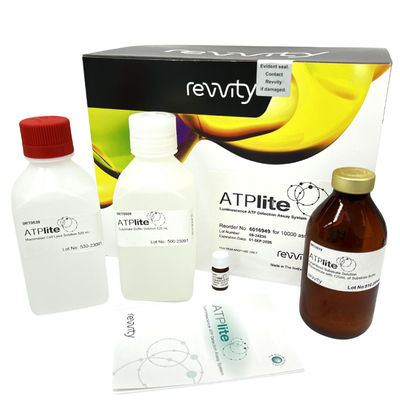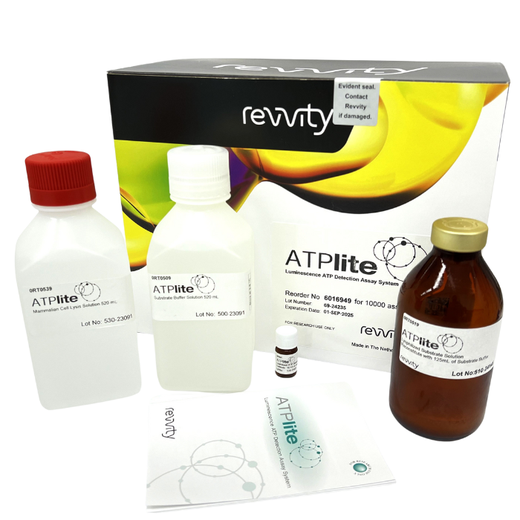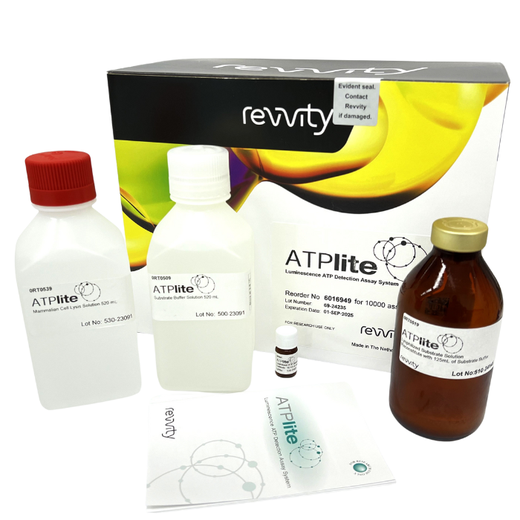
ATPlite Luminescence Assay System 96-well, 300 Assay Points

ATPlite Luminescence Assay System 96-well, 300 Assay Points




ATP-monitoring luminescence assay for quantitative evaluation of proliferation and cytotoxicity of cultured mammalian cells.
| Feature | Specification |
|---|---|
| Application | Cell Viability |
| Assay Points | 300 |
ATP-monitoring luminescence assay for quantitative evaluation of proliferation and cytotoxicity of cultured mammalian cells.


ATPlite Luminescence Assay System 96-well, 300 Assay Points


ATPlite Luminescence Assay System 96-well, 300 Assay Points


Product information
Overview
ATP is a marker for cell viability because it is present in all metabolically active cells. Because ATP concentration declines rapidly when cells undergo necrosis or apoptosis, monitoring ATP is a good indicator of cytocidal, cytostatic and proliferation effects. Discover our ATPlite™ cell viability assay. Our ATPlite and ATPlite 1step luminescence assay systems use patented innovative technologies that measure cell viability, proliferation and cytotoxicity in mammalian cells based on the production of light caused by the reaction of ATP with added luciferase and D-luciferin.
ATPlite is an Adenosine TriPhosphate (ATP) monitoring system based on firefly (Photinus pyralis) luciferase. This luminescence cell viability assay is the alternative to colorimetric, fluorometric and radioisotopic assays for the quantitative evaluation of proliferation and cytotoxicity of cultured mammalian cells. ATP monitoring can be used to assess the cytocidal, cytostatic and proliferative effects of a wide range of drugs, biological response modifiers and biological compounds.
Advantages:
- Long-lived luminescent signal: half-life (t1/2) greater than 5 hours, depending on cell type and medium
- Rapid: results generated in 15 - 25 minutes
- Simple and reproducible: no separation steps; only two reagent additions
- Homogeneous assay: no cell harvesting or centrifugation required
- Sensitive: down to 5 cells in 100µL medium (derived from CHO and HL-60 cells in 100µL medium)
- Wide linear dynamic range: =105 (as derived from CHO and HL-60 cells)
Specifications
| Application |
Cell Viability
|
|---|---|
| Assay Points |
300
|
| Automation Compatible |
Yes
|
| Brand |
ATPlite
|
| Cellular or Signaling Pathway |
Autophagy
Cell Death
Cell Growth
Cytotoxicity
Necrosis
|
| Cellular Process |
Autophagy
Cell Death
Cell Growth
Cytotoxicity
Necrosis
|
| Detection Modality |
Luminescence
|
| Format |
Microplates
|
| Protocol |
2-step
|
| Signal Halflife |
At least 5 hours
|
| Shipping Conditions |
Shipped Ambient
|
| Unit Size |
300 (96-well) / 1200 (384-well)
|
Citations
Resources
Are you looking for resources, click on the resource type to explore further.
Discover the cutting-edge of luminescence assay technology, offering unparalleled sensitivity and dynamic range for applications...


How can we help you?
We are here to answer your questions.






























